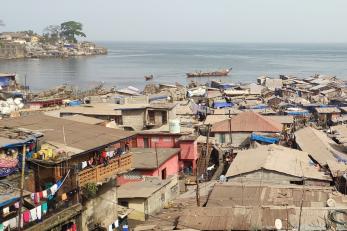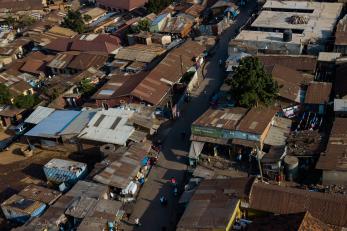Unlocking finance for energy access in informal settlements
Lessons from Sierra Leone and Uganda

As Africa urbanizes at an unprecedented pace, with 609 million people now living in urban areas, ensuring access to clean, sustainable energy in cities remains one of the continent’s most pressing challenges. Around 60% of these urban dwellers reside in informal settlements, where access to basic services such as clean water, sanitation, and energy is severely limited. Addressing this issue is critical not only for local development but also for achieving global sustainability goals. Two recent studies by Energy 4 Impact examining energy access in the capital cities of Sierra Leone and Uganda, highlight the urgent need for solutions to meet the basic infrastructure demands of these underserved urban populations. The reports explore financing instruments and market-driven models that could hold the key to unlocking clean, sustainable energy for millions across sub-Saharan African cities, offering valuable insights for service providers, policymakers, investors, and development agencies.
Africa's urban energy challenge: a crisis on the horizon
By 2050, Africa’s urban population is set to double. Cities like Freetown and Kampala are already experiencing rapid growth, often outpacing formal urban planning and infrastructure development. In many cases, informal settlements—unplanned, resource-poor neighborhoods—are left disconnected from basic modern services. These communities overwhelmingly rely on polluting and fuel-inefficient cooking practices and often resort to unsafe and illicit electricity connections for lighting and powering appliances, where the grid is available.
Focusing on clean cooking, the reports, a culmination of studies conducted through the UK aid funded Enabling African Cities for Transformative Energy Access (ENACT) project, reveal that despite the well-established benefits of clean energy for health, economic growth, and environmental sustainability, financing the shift to clean energy solutions remains the most significant obstacle. The International Energy Agency (IEA) estimates that achieving universal energy access across Africa will require a staggering $25 billion annually until 2030, which is more than double what is currently flowing into the continent. To achieve this, the international community and local African governments will need to galvanize clean energy investment, creating financing instruments that support the private sector to innovate and scale, offering tailored financing options for consumers with limited ability to pay and derisking investments through tax breaks, subsidies, and public-private partnerships.
Sierra Leone: overcoming a deep energy divide
Sierra Leone exemplifies the region’s challenges. The country’s electrification rate is a dismal 26%, and over 80% of the population relies on biomass for cooking, primarily firewood or charcoal. However, these national averages mask significant disparities, even within urban areas. While electrification is concentrated in cities, with 49.3% of urban households using electricity for lighting, informal settlements often have minimal or no electricity access, relying on illicit connections where available. Affordability remains a major barrier, pushing many to use batteries, kerosene lamps, or other informal lighting solutions. Charcoal is the dominant cooking fuel in urban areas, with 66.7% of households relying on it, and firewood usage is still significant at 32.8%. In informal settlements, biomass is the primary cooking fuel, and limited access to cleaner technologies, coupled with the high cost of alternatives like LPG, only worsens the situation. The number of households with access to clean cooking solutions remains negligible.
The Finance mechanisms for private sector-led energy access in urban informal settlements: Sierra Leone case study emphasizes the critical role the private sector plays in advancing energy access, while also painting a picture of local energy service providers held back by a lack of financing and supportive regulatory frameworks and policies. Although innovative business models, like pay-as-you-go solar energy, have found a foothold, they have yet to scale effectively. The country’s high poverty rate (32.9% in households without electricity) and the lack of financial inclusion create barriers to securing the financial resources necessary to meet growing demand.
The report finds that grants and equity dominate financing in Sierra Leone’s clean energy sector, yet other mechanisms, such as local currency debt financing, crowdfunding, and carbon financing, are still underutilized. SMEs also have limited access to technical assistance services to improve their business models, credit worthiness and investment readiness. And while government incentives exist, they are not robust enough to de-risk investments or attract significant private capital. The key recommendation is clear: more flexible blended financing models—such as green bonds, results-based financing and crowdfunding—are needed to attract private capital.

Uganda: progress amid persistent challenges
Uganda presents a brighter picture, though challenges abound. With an electrification rate of 41.3%, the country has outpaced many neighbors in grid expansion, and off-grid solar is growing, especially in middle- and high-income segments. Urban areas see notably higher access, with 71% of households connected, and an active off-grid market serving 18% of the population, contributing to the government's goal of universal access by 2030. However, informal urban settlements face challenges akin to rural areas, with unreliable grid connections and dependence on solar lanterns or other off-grid systems. Biomass fuels dominate cooking in both urban and rural areas, with about 95% of households relying on charcoal, wood, or other forms of biomass. Despite efforts to promote clean cooking solutions like LPG and electric cooking, high prices and unreliable supply remain significant barriers, leaving informal settlements particularly disadvantaged in both energy access and cooking solutions.
The Finance mechanisms for private sector-led energy access in urban informal settlements: Uganda case study highlights Uganda’s growing solar energy market as a key success, resulting from a conducive policy environment. The government’s ambitious National Electrification Strategy, for instance, aims to achieve universal access by 2030, with solar power expected to account for more than half of new connections. Yet, despite this progress, informal settlements remain underserved, with most residents relying on biomass for cooking. E-cooking and other clean cooking solutions are still perceived as too expensive or too complicated for widespread adoption.
Financing remains a central issue here as well. The study finds that while a broader range of financing options—local debt including concessional loans, results-based financing, and microfinance—are present in Uganda, these remain insufficient to meet the scaling requirements of private companies. The country’s financial ecosystem is more developed than Sierra Leone’s, but barriers remain, particularly for small and medium-sized enterprises looking to scale.
The common ground: a financing gap too wide
Despite their differences, both countries face a common set of problems: too few financial products tailored to the unique needs of people living in urban informal settlements, and too little public-private coordination to bring energy solutions to scale. The two studies recommend greater use of blended finance—combining public and philanthropic capital with private investment to lower risks for the latter. Outcome-based financing, where funds are disbursed based on achieving pre-agreed results, is highlighted as an effective but underutilized model. In addition, both reports recommend tailoring financing that not only supports companies to grow but also facilitates affordable and accessible energy for urban customers.
The call for strong government partnerships and interventions is clear in both reports. Regulatory incentives and subsidies could help reduce risks for private investors. At the same time, governments and development partners need to ramp up public awareness campaigns, educating both consumers and financial providers on the health, environmental, and socio-economic benefits of clean energy solutions.
What can other African cities learn?
The experiences of Sierra Leone and Uganda offer valuable lessons for other cities across the continent. While the path to universal energy access, particularly clean cooking, is fraught with challenges, there are several promising strategies that could be more widely implemented to overcome them. In clean cooking, for instance:
- Tailor solutions to local conditions: Each city grows differently and faces its own unique set of challenges, so solutions must be tailored accordingly. In cities like Kampala, grid and off-grid electricity might be effective for promoting clean cooking, whereas others, like Freetown, may see greater success with LPG and hybrid cooking technologies. A one-size-fits-all approach will not work across Africa’s diverse cities.
- Innovate financial products for local needs: Traditional financing models—grants, equity, debt—aren’t bridging the gap when it comes to urban energy provision. So, cities must adopt more innovative approaches, such as concessionary lending, results-based financing or carbon financing, to attract investment in clean cooking projects that meet the specific needs of informal settlements. This, if complemented by public financing solutions, would greatly accelerate adoption of clean cooking solutions.
- Empower the private sector, but don’t rely on it alone: Private sector energy service providers are key to driving energy access, but companies need support. Governments should de-risk investments and technology innovations through tax breaks, subsidies, and public-private partnerships.
- Strengthen local financial ecosystems: Microfinance, savings groups, and pay-as-you-go schemes can bridge the affordability gap for consumers, especially in informal settlements. However, these mechanisms must be scalable and backed by regulatory support.
- Leverage carbon markets: Carbon financing represents a largely untapped revenue stream for clean cooking projects. African cities should work with international partners to ensure fair pricing and support for local energy service providers looking to enter carbon markets.
- Build awareness: Consumers in informal settlements are often unaware of the benefits of clean cooking and the supporting enabling environment. Public campaigns must emphasize the long-term health, financial, and environmental gains of switching to cleaner, more sustainable solutions. Additionally, these campaigns should educate consumers on the key public sector enablers that facilitate access to and use of these solutions.
Looking ahead
Rapid urbanization in Africa presents both a complex challenge and a vast opportunity for scaling clean energy solutions, particularly in informal settlements where energy poverty is most pronounced. Achieving universal energy access by 2030 will demand an unprecedented acceleration in investment and innovation, spurred by coordination between the public and private sectors.
The ENACT studies in Sierra Leone and Uganda offer valuable insights into how innovative financing, along with public incentives and targeted awareness campaigns, can unlock the potential of clean cooking solutions for millions of Africans. Other cities across the continent can learn from these examples, adapting them to their local contexts, and move swiftly to address the growing energy access gap in urban areas. Only then can Africa truly cook up a cleaner, healthier, and more sustainable future for its urban communities.
The reports can be downloaded here:
Exploring finance mechanisms for private sector led energy access in informal settlements – Uganda
ENACT is funded by UK Aid from the UK government via the Transforming Energy Access (TEA) platform. It is managed by The Carbon Trust and delivered by ICLEI Africa, with support from Energy 4 Impact.